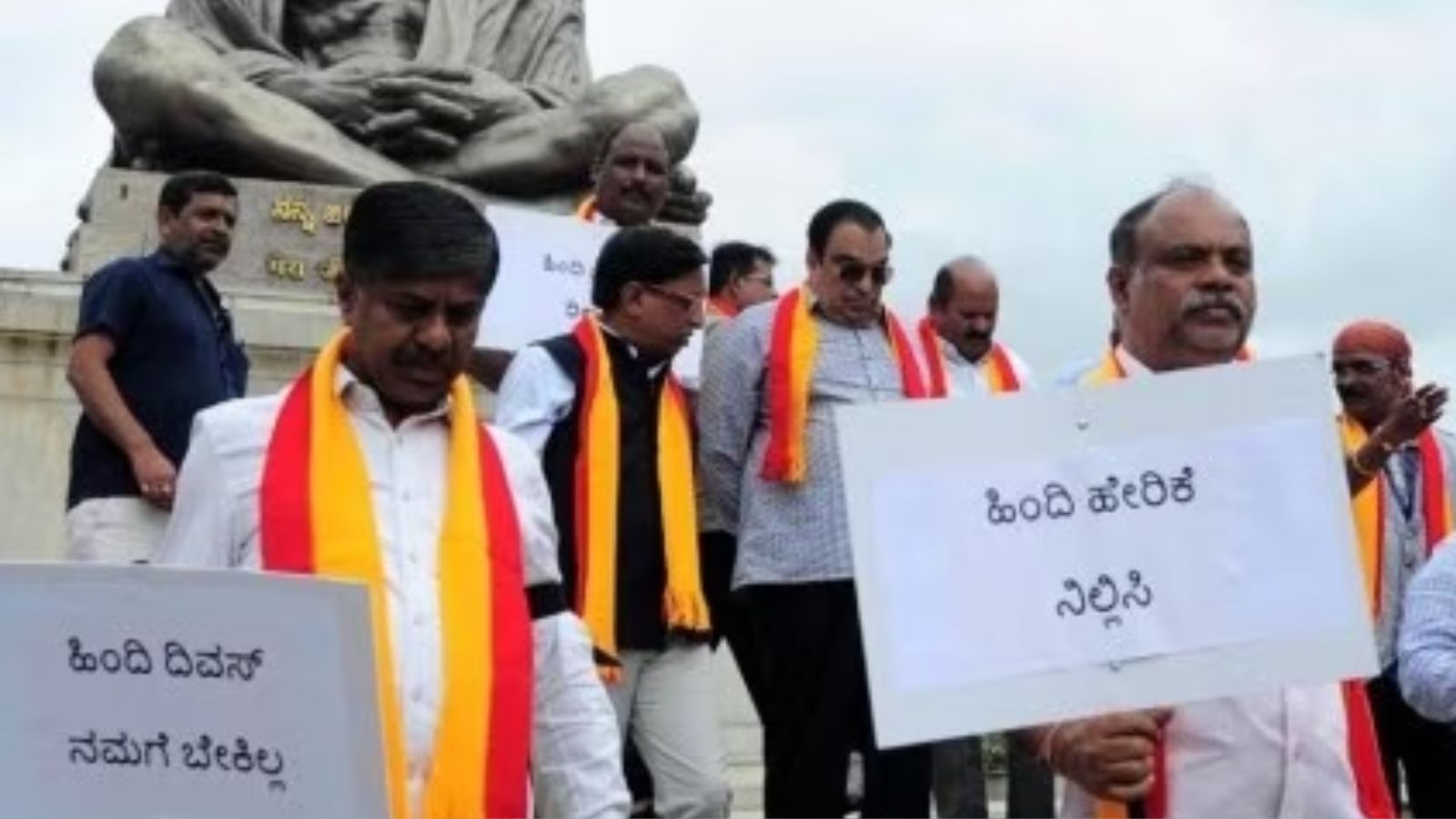You can’t be too much of a “local” in Karnataka these days. A farmer dressed in a panche (dhoti) was turfed out of a mall, even though he had the money to spend. Capitalism’s “sumptuary laws” were soon called to account by the farmer’s organisations, who have discovered that, discrimination apart, there was much that the glittering mall had brushed under the carpet, quite literally, in unpaid property taxes amounting to over Rs 3 crore, which the mall once more brushed away as “only” Rs 1.7 crores. Beneath its pretty clothes, and its petty policy, was the dirty petticoat of illegality.
Meanwhile, the government’s attempt to make the “local” more visible in the realm of work has also exploded. The vexed relationship of Kannada to the world of modern technology, industry, science, or indeed critical humanities, long lamented, has once more erupted, this time as a showdown between one of India’s classical languages and capitalism itself. The Karnataka government’s recent decision to draft a bill reserving jobs in the private sector for locals (to fulfil an election promise) has sent great shivers down the spines of industry heads, educational entrepreneurs, and real estate barons, who all fear an immediate plunge of their economic fortunes should such a “restrictive” policy come into place.
The cat among the pigeons was the proposed Karnataka State Employment of Local Candidates in the Industries, Factories, and Other Establishments Bill, 2024, which will mandate 70 per cent of non-management jobs and 50 per cent of management jobs to those who are “locals”.
How is the local defined? For one, this requires the “local candidate” to have been a domicile in Karnataka for a period of 15 years. That’s easy; there are those from other states who have been domiciled in Karnataka for up to three generations.Fifteen years of domicile in the balmy environs of Bengaluru is a piece of cake many have shared.
The part of the bill that caused the explosion insists that “migrants” to Karnataka learn the local language. For long, Karnataka and especially Bengaluru, the “Dubai of India”, has been considered a “cosmopolitan” place. This merely means that people who have lived here for decades have no obligation to wrap their heads around the local language. Karnataka must be the only state in India where journalists, writers, artists, filmmakers, techies, and scientists can operate and hold jobs without any knowledge of the regional language.
So what is this “devious political stunt” that places the majority of non-Kannada speakers under pressure? Suddenly, the world has been divided between those who are “skilled” and those who are not. Industry chiefs have raised fears that their skilled workers will dry up. The fear of the “great unskilled” son-of-the-soil is ironical, all things considered.
First, speaking, reading, and writing Kannada are considered skills that are not worth acquiring. Those who flock to Karnataka for work or education have gone to court, fought it out in editorials, or simply insisted that they need not learn Kannada; instead, they demand that the people of Karnataka respond to their needs in English, Hindi and Anything But Kannada (in many schools, the preferred language is French; go figure). Besides, we frequently hear the whine from those who have spent up to three decades in the city of Bengaluru, “I can’t find a Kannada teacher”.
Whether the suited and booted mall rats or their less well-endowed retail assistants who wear ill-fitting “uniforms”, the non-local shows scant interest in the local language. Equipped with English, they may accost anyone who may actually be able to read a Kannada newspaper or book with the shaming accusation “you can actually read Kannada”. In short, it is not a language that “people like us know” — is the “lingue” of only the panche wearer.
Second, for all those who are airing their views on the more important role the state should play in skilling/reskilling locals, the unwritten assumption is that it cannot be in the Kannada language. If the Kannadiga has not made the cut, it is because she is unskilled in the language capitalism had already made its own, namely English.
Kannada’s beleaguered existence has furrowed the brows of every government. It enjoys neither official hegemony nor a robust cultural presence. Despite its long lineage,(since the sixth century at least), its long list of Jnanpith awardees (as testimony to its literary brilliance) it remains in the shadow of English, and increasingly, Hindi. No wonder Kannada’s latest skirmish with capitalism was over nameboards in the state capital. It is a language that relies on the state to propel its existence, as large numbers desert Kannada-medium schools for the preposterous privately-run hoax that passes in the name of English medium schools.
This extraordinary thinning of language (all languages) is something that should worry those who are worried about real estate, profits, and quick returns on investments. It should worry the state, if its efforts to promote Kannada learning have not succeeded despite establishing a Kannada Development Authority, periodically passing rules regarding the teaching of Kannada in schools and colleges, and supporting billboards in Kannada. It should equally worry those speaking in the name of the economy since the “functional” English among those who staff the vast economic machine is by no means a cultural achievement.
Is this a case of politics versus the economy? Has the battle already been lost? Can the citizens of Karnataka, local and migrant, give up being “cosmopolitan” in its most emaciated form, in order to become cosmopolitical? This will require not only the will of the state, but also the support of the bourgeoisie. But above all, it requires reorienting the desire of the people. Karnataka still has the chance to build a robust bilingual policy, which will enable the local to participate, not only in the economy but as an equal partner in a culture of self-respect, civility and self-worth.
The writer is a Bengaluru-based historian and was Professor of History at JNU, Delhi



